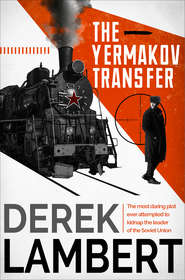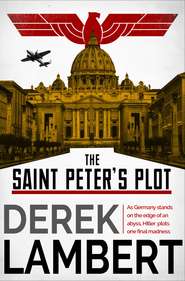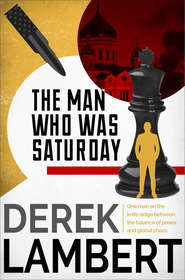По всем вопросам обращайтесь на: info@litportal.ru
(©) 2003-2024.
✖
I, Said the Spy
Автор
Год написания книги
2018
Настройки чтения
Размер шрифта
Высота строк
Поля
Anderson knew. Oleg Penkovsky had been deputy chief of the Soviet State Committee for the Coordination of Scientific Research. He was also a colonel in Russian military intelligence – and a spy for the West.
But when he had first tried to join the CIA in Turkey he had been turned down. The British had enlisted him and offered to share his secrets with the CIA. The spirit of cooperation that had foundered after the Burgess/Maclean/Philby debacles had been re-established.
At his trial in May 1963 Penkovsky had admitted passing 5,000 frames of film showing Soviet classified information and had been sentenced to death.
‘Is it necessary to cooperate in this case?’ Anderson asked.
‘It’s in your own interests. As you probably know Prentice has a good front. Not only is he a professor of economics but he runs an industrial consultancy for an English businessman named Paul Kingdon. He might even know more about the industrialists attending Bilderberg than we do.’
Danby stood up and walked over to the globe in the corner of the office. ‘I have a few thoughts about Herr Danzer,’ he said, spinning the globe. ‘You see, he conforms to a pattern. We’ve met Karl Danzers before. Soviet agents with a liking for Western decadence who don’t have the opportunity to enjoy it to the full.’
‘You think he can be turned, sir?’
‘That’s for you to find out. And that’s where Prentice will be useful. You see, I figure you might be a little conspicuous here,’ as his finger landed unerringly on Zurich on the spinning globe.
III (#ulink_42b606a4-7dd1-5094-a50e-5366250e4e3c)
Zurich is Switzerland’s largest city. It is also one of the world’s largest storehouses of money and therefore a dull place: bankers do not besport themselves on their own premises.
The streets of the city, divided by the Limmat River, are clinically clean, the night-life as permissive as a whist-drive. It is not, however, without its charm – the historic guild-houses, the twin towers of Grössmunster Church, said to be the finest example of Romanesque Ecclesiastical architecture in Switzerland, the backcloth of snow-crested mountains.
But the language is Swiss francs, and when the leaves of the trees on Bahnofstrasse are ruffled by a breeze from Lake Zurich they rustle like bank-notes.
Dull.
But not when you are twenty years-old and in the arms of the man you love. A wonderful man, a handsome man, an idealist …. Idealists are thin on the ground in Zurich.
Helga Keller stirred and looked into the brown eyes of Karl Danzer. ‘Tell me again,’ she said.
‘Tell you what?’
‘Tell me about Russia.’
‘Ah Mother Russia. The steppes sparkling in the snow beneath blue skies in winter … the wind rippling the corn in summer … the cottages like fretwork dolls’ houses … the forests of birch where tigers still prowl ….’
‘And Moscow,’ she said, snuggling up against him on the couch in his apartment. ‘Tell me about Moscow.’
He kissed her. ‘You will see it one day. Soon perhaps. Hear the music of the skates on the ice in the parks … see the domes of the Kremlin gold in the dawn …. Taste the fires of vodka as we drink with our comrades.’
‘I like to hear you talk about comrades,’ she said. ‘I like to hear about people who are … alive.’
Neither her father’s friends, nor the girls at the finishing school at Basle, had been alive.
‘They are alive – full of life – because they share. That is the heart of the matter. Sharing. Common endeavour. Even today,’ throwing out one arm as though dashing a glass against the wall, ‘we still drink to the glorious revolution. The revolution that will one day spread throughout the world.’
Helga Keller glowed with the visions. ‘And we shall be part of it. If only I could help more ….’
‘You have helped already,’ Danzer told her. ‘They are very pleased with what you have done.’
‘And to think that until three months ago I didn’t spare a thought for this … this sharing. I’d read about Communism, but here they talk about it as if it is a crime ….’
‘To such people,’ Danzer said, ‘Socialism is a crime. Grand larceny. The theft of their privilege. The distribution of their wealth to the underprivileged …. Has it been three months?’ he asked in surprise.
‘Two months, two weeks, three days ….’ She felt the warmth of the sunshine reach her through the window. Outside, the lake sparkled, the flanks of the mountains were green with young growth. Helga had known from the moment she awoke that the hazy dawn was filled with portent; that June 12th 1971, was one of those days that would change her life; she glimpsed patterns of destiny and was filled with delicious anticipation.
She stretched herself and took in the apartment. It was, she supposed, expensively furnished – she had no yardstick by which to judge expenditure – but certainly not lavishly. (Karl had explained that, to maintain his front, he had to live reasonably well.)
It certainly needed a woman’s touch. But there was no chance of a permanent relationship in Zurich. Karl had explained that, too.
Karl put his arm round her. He was wearing grey flannel trousers and a blue silk shirt tapered at the waist; through the silk she could feel the thud of his heart. His hand stroked her waist, then cupped her breast. Wings of fear – or was it excitement? – fluttered inside her. She was so inexperienced, ridiculous in 1971. But if you were the daughter of a Zurich banker …. She hoped that he would understand; be grateful, even, that she had kept herself …. God, what an antiquated expression ….
‘Helga.’
She didn’t reply. It was ridiculous. They both knew …. Did he perhaps think that she didn’t want to? How do I show him? Then a thought occurred to her that made her feel suddenly foolish. Supposing he didn’t want to? She wasn’t a raving beauty. Her long, dark, lustrous hair had been much admired but nothing much else; no one had ever complimented her on her figure, although it wasn’t too bad, perhaps a little too full. Swiss! She closed her eyes in mortification and the warmth of the sun no longer reached her.
‘I love you,’ he said as his hand caressed her breast. Feeling exploded inside her.
He led her to the bedroom which she would remember for the rest of her life. The deep white carpet and the books on the bedside table, and the smell of after-shave and the triangle of blue water jostling with light through the roof-tops. He lay on the single bed and she lay beside him and he kissed her lips, her neck, her breasts which had somehow become exposed.
He went to the bathroom, returning in a dressing gown embroidered with Chinese patterns, by which time she was naked beneath the sheets. Trembling.
Would he know immediately that she was a virgin? In the books that she had read surreptitiously at finishing school – sex was a subject that was never finished, not even started —they always knew and the girl said: ‘Please don’t hurt me.’
His lips were on her breasts and she was guiding his hands to the warm mound that needed him. His hardness astonished her: it was like warm marble. She slid her fingers along its length, then wanted him inside her. Karl, my love …. She lay back and opened her legs and guided him.
And afterwards she couldn’t remember whether or not there had been any pain.
* * *
When they began to make love George Prentice removed his earphones and switched off the receiver in an apartment not far from Danzer’s.
He removed the tiny cassette that had been recording the conversation between Karl Danzer and Helga Keller, labelled it and stacked it neatly in the wooden cigar box containing the other Danzer recordings. A dozen of them in all.
Danzer, you’re not a pro: you should sweep your apartment every day. But that, Prentice knew, wasn’t true: Danzer was a pro. It was merely that he had become careless, his reactions dulled by the good life – and the mistaken belief that he was above suspicion.
Stupid bitch, he thought, as he considered what Helga Keller was now doing in Danzer’s bedroom. Did she imagine she was the only one? She should hear some of the other recordings.
Prentice, lean-framed with scholarly good looks, which he managed to conceal partially by his own indifference to them – that worked, he found, when you were over thirty – lit a cigarette. Acquaintances of Prentice, none of them close, sometimes commented that there was an unfulfilled air about him, that he had sublimated his personality. They were right but they were never able to elaborate: Prentice didn’t let them.
He turned his attention to the Daily Telegraph crossword. He had been on the point of breaking his record, ten minutes, when he had been interrupted by Danzer and the girl. The clues now seemed more enigmatic than before; he had lost contact with the mind of their author.
In fact the conversation which he had overheard had disturbed him more than he had so far admitted to himself. It was as though he had unlocked a room and found the perfume of a woman he had once loved still lingering there. Stupid bitch, he thought again.
He poured himself a Scotch and soda and wished that Anderson would get back. He should have arrived on the Swissair flight from New York two hours ago, at 11.40 am, to resume his duties. And Anderson’s duties – at least when Danzer was in town – were confined to electronic surveillance: you didn’t let a 6ft. 2 inch, 220 pounds black loose in Zurich without attracting attention.
Prentice had been surprised to discover that the head of security at Bilderberg also worked for the CIA; Anderson, apparently, had experienced no such astonishment that a former Professor of Economics at Oxford played a dual role. ‘It’s not Oxford that worries me,’ he had said. ‘It’s those sons-of-bitches from Cambridge.’
The buzzer beside the small grille on the wall sounded. Prentice pressed the button. ‘Who is it?’ Anderson’s voice accompanied by street noises: ‘It’s me.’ (‘Owen,’ if there was any trouble.)











